Mamadou’s mother, Salematu, discovered that her precious little boy was unable to see clearly when it was time for him to start walking. She noticed that he struggled to pick up objects or walk around without stumbling. She brought Mamadou, her only son, to the local hospital, but the doctor said he was too young to get surgery.
“Whenever I look at my son, I feel sad. I am not happy about his condition,” the concerned mother lamented. Mamadou’s impaired vision meant that he could not have a normal childhood. Other children provoked and laughed at him because of his condition. Little Mamadou was most affected whenever the sun was out, as the light inhibited his movements. Though his mother ensured he still went to school, by the age of 7, Mamadou could not read and write clearly.
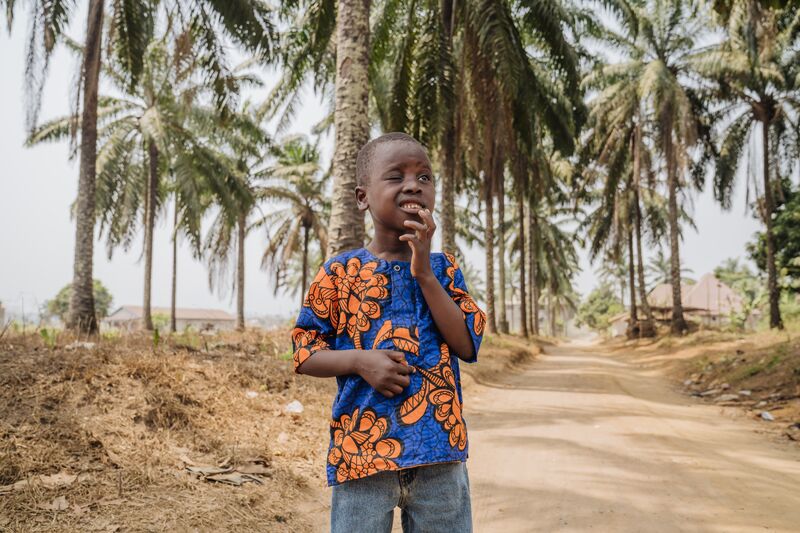
According to Francess Tommy, a Mercy Ships day crewmember from Sierra Leone, life is difficult for children like Mamadou in most parts of the country. “People discriminate against them, relate the condition to witchcraft, and some neighbors will not let their children play with them because of the belief that they are possessed,” she shared. Francess added that most kids with such a condition in their country grow up to become beggars on the streets, as they are unable to work and take care of themselves.
Thankfully, Mamadou belongs to a close-knit family that loves and supports him, including a younger half-sister, cousins, and close members of his community. He is known for being patient, engaging, and happy to make friends.
Finding Mercy
Mamadou’s uncles were relentless in their search for a solution. Their efforts were unsuccessful until they heard from an older uncle that Mercy Ships was bringing its new hospital ship, the Global Mercy™, to Sierra Leone to provide safe surgeries free of charge on board. Coincidentally, this uncle received a hernia surgery from Mercy Ships many years ago.
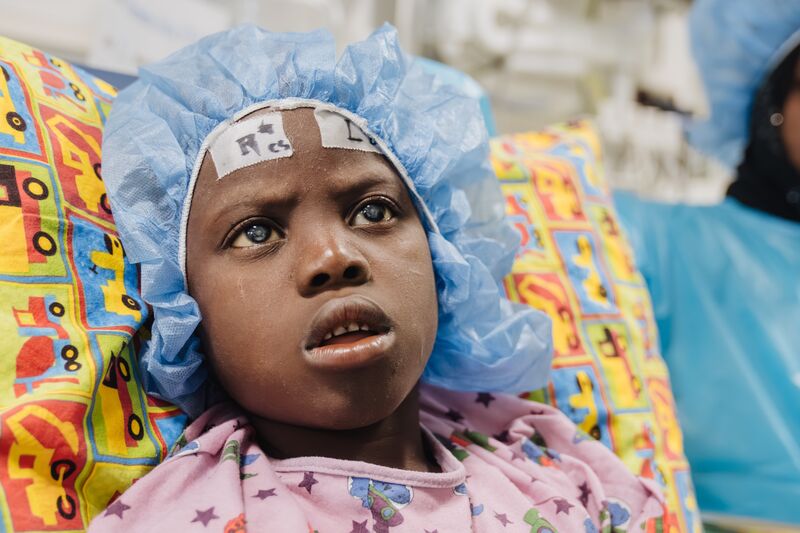
One of these uncles, Muhammed, accompanied 7-year-old Mamadou to the ship for his first appointment. “I was so happy that [he] was selected. I know that after Mamadou regains his sight, he will achieve many things in the future by God’s grace,” said Muhammed, expressing his excitement and enthusiasm.
The volunteer ophthalmic team manager, Ella Hawthorne, still remembers her first encounter with little Mamadou. “Meeting Mamadou during patient selection here in Sierra Leone was just special. He is wonderful and quiet at first, but once you get to know him more, he comes out of his shell and engages you.”
A Quest for Sight
When Mamadou first boarded the Global Mercy, his eyeballs were moving sporadically as he looked around. Dr. Paulius Rudalevicius, the volunteer ophthalmic surgeon from Lithuania who operated on Mamadou, explained that the irregular movement was an attempt to catch objects. “We suspect that the bilateral cataracts were there at birth, and slowly got worse. So, he has some kind of vision, but the lenses inside are opaque. We call it nystagmus.”
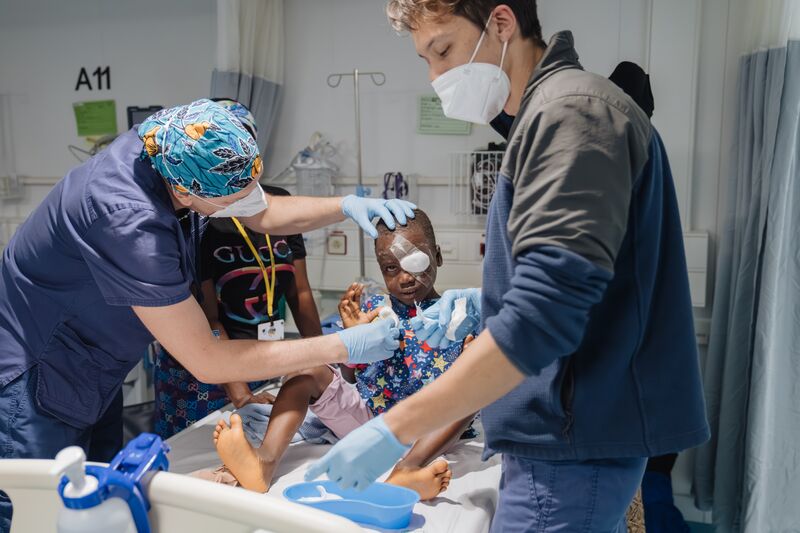
Dr. Rudalevicius highlighted inherited cataracts and malnutrition as common causes of the condition. Surgery for the 7-year-old was not only going to be lifesaving but also time-sensitive. He stated that without timely surgery, Mamadou would never be able to regain his sight.
“If we do surgery after ten years, the result will not be so good because he will have severe amblyopia,” Dr. Rudalevicius shared. “If the cataracts are not removed soon enough, the brain can never learn to see, even if the cataracts are removed.”
Regaining Vision
Assisted by a team of medical volunteers, Dr. Rudalevicius performed a manual small incision cataract surgery. The operation took just two hours yet made a lifelong impact as it represented the start of a new vision and future for Mamadou.
Just the next day, Mamadou’s eye patches were removed. It was a joyous moment for everyone that witnessed it – but most especially, his mother. The elation on her face was palpable. “My son can see me! My son can go back to the community and interact with other children,” Salematu celebrated.
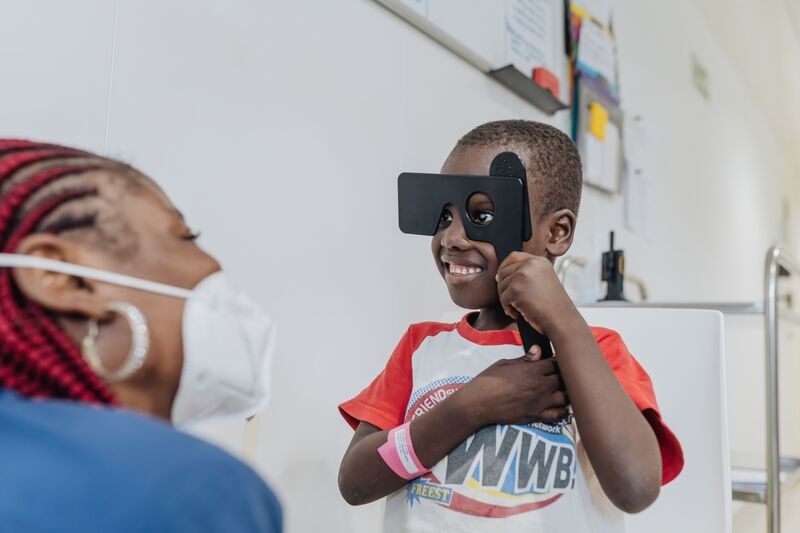
For Mamadou, it was a moment of slight confusion, as it marked the first time in his life he could see things so clearly. He looked around, trying to understand new information and identify unexpected objects. Dr. Rudalevicius explained that this reaction is normal for children like Mamadou. “Usually, they are surprised and shocked after the surgery. If they can wave, point, or count fingers, that is a good sign.”
His brain was not yet used to processing such a high level of visual activity – but after seeing the crowd around him smile and wave, Mamadou quickly joined in, exuding his bright and endearing smile in return.
A few hours after his eye patches were removed, Mamadou was given a pair of sunglasses to help stabilize his new vision. He also received crayons and paper to do some coloring, a task he was more than happy to do alongside other children in the hospital ward. He soon picked up a toy motorcycle and rode around the ward, putting his improved sight to use immediately by avoiding any obstacles in his way.
A month later, Mamadou returned to the ship with his mother for a celebration of sight, a ceremony for patients who have received successful eye surgeries. There, Salematu celebrated the tangible differences she’d seen in her son every day since his operation: “Mamadou can do work for me now. Unlike before, he can now move around without jumping his steps or falling, even when the sun is out,” she said. Now free to dream about a better future for her son, Salematu shared her hopes that Mamadou will one day grow up to become a medical doctor and make a difference of his own.
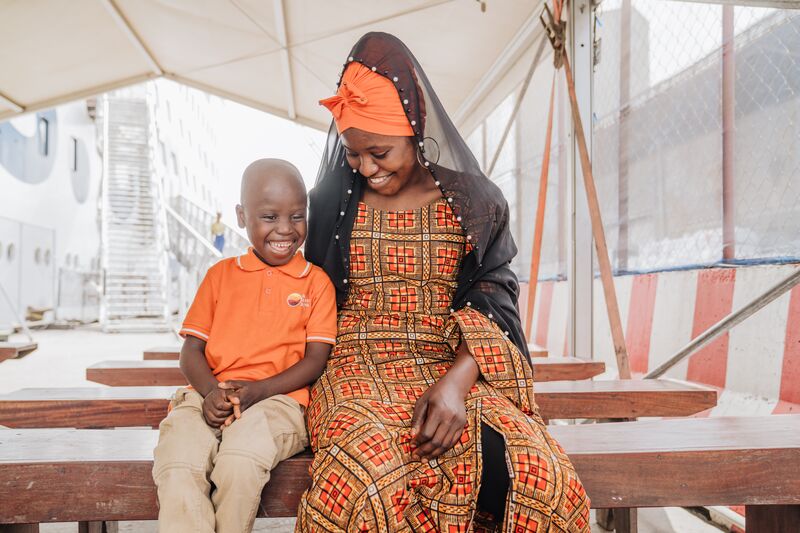
Thanks to the generous support of donors and volunteers from around the world, Mamadou has new vision and restored hope for the future.
